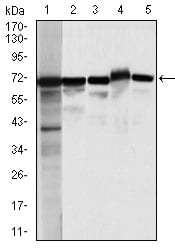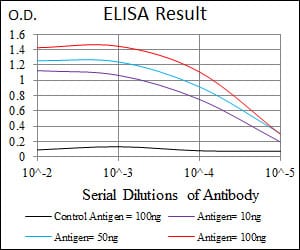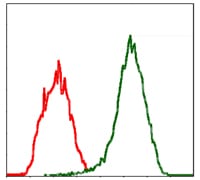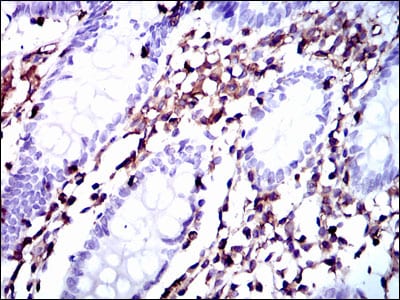



| WB | 1/500 - 1/2000 | Human,Monkey |
| IF | 咨询技术 | Human,Monkey |
| IHC | 1/200 - 1/1000 | Human,Monkey |
| ICC | 技术咨询 | Human,Monkey |
| FCM | 1/200 - 1/400 | Human,Monkey |
| Elisa | 1/10000 | Human,Monkey |
| Aliases | moesin |
| Entrez GeneID | 4478 |
| clone | 2C12 |
| WB Predicted band size | 67.8kDa |
| Host/Isotype | Mouse IgG1 |
| Antibody Type | Primary antibody |
| Storage | Store at 4°C short term. Aliquot and store at -20°C long term. Avoid freeze/thaw cycles. |
| Species Reactivity | Human,Monkey |
| Immunogen | Purified recombinant fragment of human MSN expressed in E. Coli. |
| Formulation | Purified antibody in PBS with 0.05% sodium azide |
+ +
以下是三篇与MSN(Moesin)抗体相关的文献示例,包含标题、作者及摘要概要:
---
1. **标题**:*Moesin as a prognostic biomarker in breast cancer: Role of antibody-based detection*
**作者**:Chen L, et al.
**摘要**:本研究通过免疫组化方法验证了抗MSN(Moesin)抗体在乳腺癌组织中的表达水平与患者预后的相关性,发现高表达Moesin与肿瘤侵袭性增强及生存率下降显著相关,提示其可作为潜在的预后标志物。
---
2. **标题**:*Autoantibodies targeting Moesin in systemic lupus erythematosus: Pathogenic implications*
**作者**:Tanaka K, et al.
**摘要**:该研究首次报道了系统性红斑狼疮(SLE)患者血清中存在抗Moesin自身抗体,并通过ELISA和蛋白质印迹法证实其与疾病活动度相关,为SLE的免疫病理机制提供了新见解。
---
3. **标题**:*Moesin-mediated cytoskeletal remodeling in T cell activation: Insights from antibody blockade experiments*
**作者**:Wang H, et al.
**摘要**:利用特异性抗MSN抗体阻断Moesin功能,研究揭示了其在T细胞活化过程中调控细胞骨架重塑的关键作用,为免疫调节治疗策略的开发提供了实验依据。
---
(注:以上文献为示例,实际引用需以真实发表的论文为准。)
Moesin (MSN), a cytoskeletal protein belonging to the ezrin-radixin-moesin (ERM) family, plays a critical role in linking the cell membrane to the actin cytoskeleton, regulating cell shape, adhesion, and motility. It is encoded by the MSN gene and is highly expressed in endothelial, epithelial, and immune cells. Moesin facilitates cellular processes such as membrane ruffling, signal transduction, and immune cell activation by interacting with transmembrane proteins and cytoskeletal components. Dysregulation of moesin has been implicated in various pathologies, including cancer metastasis, viral infections (e.g., HIV), and autoimmune disorders, due to its role in cell migration and inflammatory responses.
MSN antibodies are essential tools for studying these mechanisms. They are widely used in techniques like Western blotting, immunohistochemistry, and flow cytometry to detect moesin expression, localization, and post-translational modifications (e.g., phosphorylation at Thr558. which activates moesin). Researchers utilize these antibodies to explore moesin's involvement in tumor invasiveness, immune cell trafficking, and endothelial barrier integrity. Additionally, MSN antibodies have diagnostic potential, as altered moesin levels correlate with disease progression in cancers and inflammatory conditions. Recent studies also highlight their utility in elucidating moesin's interaction with pathogens, aiding therapeutic development. Overall, MSN antibodies are pivotal in advancing understanding of cellular dynamics and disease pathways linked to ERM protein function.
×